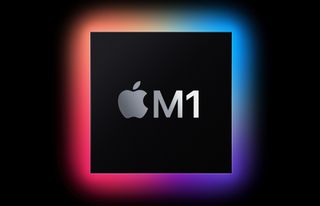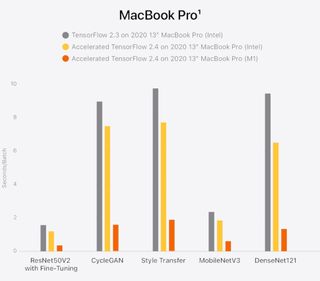New Apple M1 MacBook Pro trounces Intel-based predecessor on AI training
7x faster and Apple's new CPU only just warming up (not literally)

Apple has released a new version of Google's TensorFlow v2.4 machine learning library that’s optimized for its new M1-powered Macs.
The new M1-optimized release leverages Apple’s new ML Compute framework that’s meant to accelerate training of neural networks by employing not just the CPUs, but also any available GPUs.
Apple’s new ML Compute framework is included with its latest macOS Big Sur release and enables TensorFlow users to now use the full potential of the M1’s 8-core CPU and 8-core GPU.
- Take a look at the best mobile workstations
- These are the best business laptops
- We've also compiled a list of the best workstations out there
Top performer
The new ML Compute framework utilizes the high performance BNNS primitives made available by the Accelerate framework for the CPU and Metal Performance Shaders for the GPU.
Reports quote Apple as claiming that using the optimized TensorFlow release users can get up to 700% faster training on the 13-inch MacBook Pro with M1. Apple also claims that training a style transfer algorithm on an Intel-powered 2019 Mac Pro with the TensorFlow optimizations complete in around two seconds as opposed to six on unoptimized TensorFlow releases on the same machine.

When ML Compute was first announced, developers had trouble adapting their existing ML scripts to interface with the new API. Apple has now eliminated those issues with this new TensorFlow fork.
Developers can now simply download and use the Mac-optimized TensorFlow 2.4 fork to take full advantage of the resources on their new M1-powered Macs without making any changes to their TensorFlow scripts.
Are you a pro? Subscribe to our newsletter
Sign up to the TechRadar Pro newsletter to get all the top news, opinion, features and guidance your business needs to succeed!
Writing in the official TensorFlow blog, Apple developers say that they’ll soon integrate the fork into the TensorFlow mainline.
- We’ve also curated a list of the best cloud computing services
Via: VentureBeat
With almost two decades of writing and reporting on Linux, Mayank Sharma would like everyone to think he’s TechRadar Pro’s expert on the topic. Of course, he’s just as interested in other computing topics, particularly cybersecurity, cloud, containers, and coding.

